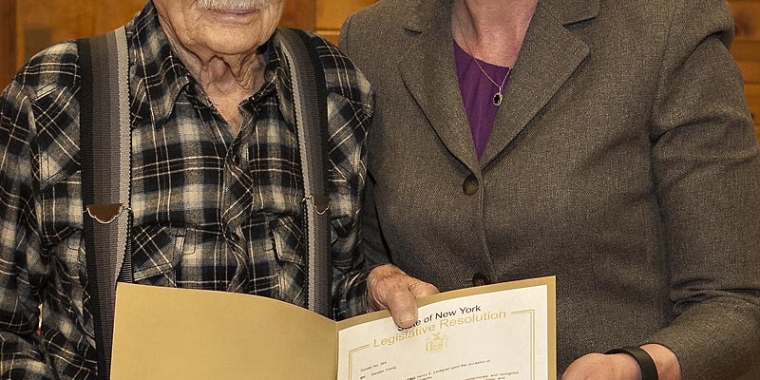
Senate to Act on Bills to Help Veterans and Military Members
Catharine Young
May 29, 2008
Senator Young today acted on several bills to provide greater benefits and protections to New York’s military personnel. The legislation includes measures to provide better access to health and mental health services, employment opportunities, support for the families of New York’s service members, and ways to commemorate and honor those who serve our state and nation.
The legislation includes bills that would:
> allow members of the armed forces to take special military make up civil service exams (S.7792, Senator Leibell);
> authorize State and Municipal employees to be paid for up to 45 days of military deployment each year, up from 30 days (S.7830A, Senator Leibell);
> amend the domestic relations law to state that a parent’s military status shall not affect his or her parental rights during custody proceedings (S.5863, Senator DeFrancisco);
> add two members to the mental health services council -- one from the Division of Veterans Affairs and one from the Division of Military and Naval Affairs (S.7183A, Senator Morahan);
> unify New York's dates for authorized action in Lebanon to match the federal government's start date for purposes of pension credit (S.7956, Senator Flanagan);
> establish the Veterans Memorial Preservation Act (S.7879-A, Senator Leibell); and
> extend the statue of limitations for actions involving exposure to Agent Orange for two years (S.7832, Senator Leibell).
The legislation that will be acted on today builds on the Senate’s ongoing efforts to provide assistance and benefits to New York’s veterans and active military members, including the innovative Patriot Plan which provided numerous benefits to our service men and women fighting the War on Terror.
The Senate previously gave final legislative approval to a bill that would:
> permit the New York State Department of Civil Service to increase the number of entry-level competitive class positions from 300 to 500 that it can reclassify to noncompetitive class positions to promote the appointment of veterans with disabilities (S.7791, Senator Leibell).
In addition, the Senate has also passed legislation that would:
> prohibit courts from making determinations in child custody proceedings when a parent is activated, deployed, or temporarily assigned to military service (S.5860, Senator Rath);
> Authorize the use of State funds for the operation and maintenance of state veterans’ cemeteries (S.8010, Senator Leibell);
> exempt military personnel serving in a combat zone from income tax on compensation for their service (S.3574-A, Senator Lanza);
> provide a United States burial flag for veterans of the New York Guard (S.7515, Senator Saland); and
> allow the Defense Department 214 as proof of service for Cold War veterans applying for a real property tax exemption (S.6697, Senator Maziarz).
Veterans’ Programs in the State Budget
This year’s state budget included $4.5 million to provide tuition assistance for veterans enrolled in an approved graduate, undergraduate and vocational program. Veterans’ tuition assistance was increased from $2,000 per year to $4,350, allowing veterans to attend a SUNY or CUNY school tuition-free. If a veteran chooses to attend a private school, they will receive the equivalent towards their education costs.
Veterans enrolled in part-time studies will receive a pro-rated amount. In addition, the enacted budget expanded the eligibility for this program to cover all veterans who served in the Armed Forces in any hostilities since 1961.
The program is a Senate Majority initiative that originally passed unanimously in the Senate last year (S.6288, Senator Bruno).
The 2008-09 state budget includes $250,000 to train mental health providers in veteran-specific mental health issues, including post-traumatic stress disorder, traumatic brain injury, and substance abuse issues. (S.6799-A, Senator Fuschillo, Passed Senate 5/12/08)
The budget also included $150,000 for the Canines for Veterans Program, to provide working support dogs to combat veterans who are injured in the line of duty, a program initiated by the Senate Majority.

